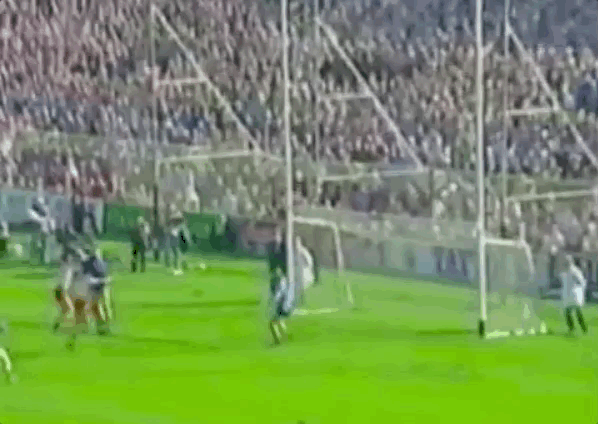Tyrone were robbed in the 1995 All-Ireland championship. At the very least, they were robbed a draw.
At 1-10 to 0-12, Sean McLaughlin equalised with the last attack of the game but the referee disallowed it, ruling that Peter Canavan had touched the ball on the ground.
Canavan did touch the ball on the ground but it was not a foul.
You see, he fell while in possession and, under the GAA rules, anyone who falls or is knocked to the ground is allowed to play the ball on the ground – as long as it is one strike. Canavan slipped and had the presence of mind to strike the ball out to McLaughlin who finished the job. It wasn’t just a clever piece of play but it was legal – and wrongly punished.

23 years later and too many GAA people still aren’t aware of the rule.
In fact, on Sunday, Sean Hurson was being accused of missing a touch on the ground when Damien Comer set up Patrick Sweeney to go through one-on-one at the end of the first half.
Mark Donnellan was forced into making a fantastic reflex stop but each of the Kildare defenders, Darragh Maloney on commentary and Colm O’Rourke on analysis in studio suggested that Comer fouled the ball when he was knocked to ground and struck it to Sweeney.
He didn’t – and this rule is constantly overlooked, particularly at club level.
RULE 1: THE PLAY
1.2 When the ball is on the ground, it may be played by any part of the body except the hand(s). It may be lifted off the ground with the feet.
Exceptions
(i) The goalkeeper may play the ball on the ground with his hand(s) inside his own small rectangle.
(ii) Any player who falls or is knocked to the ground while in possession of the ball may fist or palm the ball away on the ground, and may score by so doing.
(iii) The ball may not be lifted off the ground with the knees.
Any player who falls or is knocked to the ground while in possession of the ball may fist or palm the ball away on the ground.
You can imagine the amount of referees in club games who don’t want to enforce that rule (if they know it) because it looks like a blatant foul on the ball and the outcry is enough to penalise.
But players all over the country aren’t being protected by one of the fundamental playing rules of the game and the one rare time that Comer was protected on Sunday, both him and the referee were accused of bending the law.















































